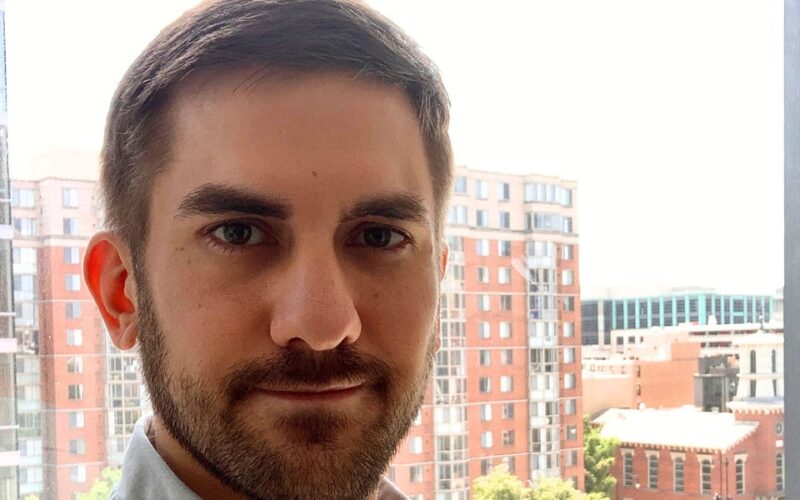Roland Hesmondhalgh started searching for a job in January 2020. He’s still looking.
In 2019, Hesmondhalgh was a part-time photojournalist while working toward a bachelor’s degree in multiplatform journalism at the Florida Institute of Technology. He thought it might lead to a full-time opportunity after he graduated, but then he was laid off, the Virginia-based 32-year-old told Business Insider via email.
Aside from the occasional freelance gigs doing photography or YouTube scriptwriting — which he said pay very little — he hasn’t found work since.
It hasn’t been for a lack of effort. Hesmondhalgh said he looks and applies for jobs every week, and earned a Master’s degree in journalism from Georgetown last year. He’s even expanded his job search to restaurant and retail jobs — e.g. “stocking shelves and flipping patties,” he said.
But he’s struggled to even get a second interview for any job. Hesmondhalgh said his journalism degrees have “opened no doors” and that he’s overqualified for many of the entry-level positions he’s applied for — something he thinks has made some employers less likely to hire him.
“I cannot get a job to save my life,” he said.
While the male unemployment rate is low compared to past decades, Hesmondhalgh is among the men who have struggled to find work — or have stopped looking altogether. In 1950, about 97% of American men ages 25 to 54 had a job or were actively looking for one, according to the Bureau of Labor Statistics. As of June, this figure had fallen to about 90% — though it’s the highest it’s been since 2010.
Among the explanations for this decline is that in recent decades, it’s become difficult for some men to land a high-paying job without a college degree. These challenges persist today for men even as more companies have become open to hiring candidates without degrees. But as Hesmondhalgh can attest to, having a degree doesn’t guarantee success in the job market. Factor in the cost of college and pursuing a degree might not be worth it for some people.
Hesmondhalgh shared why he thinks his job search has been so challenging and what he plans to do moving forward.
His degrees have sometimes worked against him in his job hunt
Without a consistent income coming in the door, Hesmondhalgh said he’s been forced to rely on student loans, the Amazon sales of a young-adult book he published, insurance money tied to the death of his father, and his mother’s disability payments — some of which she shares with him.
To save money on rent, he recently moved from Washington, DC to Arlington, Virginia. If his job struggles continue, he said he’ll likely move in with his mother next year.
Hesmondhalgh said his job search strategy has consisted of being on the mailing list of roughly six online job boards, applying to roles in person rather than online whenever possible, and expanding his search to almost any job he feels qualified for.
Ideally, he’d land a job in journalism — the field he has two degrees in. He thinks he’s struggled to land journalism roles because most of the positions he’s looked at require three to five years of formal newsroom experience, and he doesn’t have that. A broader hiring slowdown across the industry hasn’t helped matters.
When it comes to non-journalism roles, he said he thinks his college education has worked against him.
“Wherever I see a hiring sign and think I’d be comfortable working there, I go in and talk to a supervisor,” he said. “Their eyes light up at first, but after I go over my credentials it’s just pure ghosting. I don’t want to lie, but it seems like honesty is the worst policy.”
Additionally, he said prior work experience in entry-level roles doesn’t seem to be of any value.
“For the low-level grunt work, it’s not an issue with experience,” he said, noting he’s worked in pizza restaurants, dog kennels, and supermarkets.
Hesmondhalgh said the closest he’s come to getting a job in recent years was when he applied for the Supreme Court and US Capitol police agencies. He said he had tentative job offers from both, but that, for some reason, they fell through.
Going forward, Hesmondhalgh said he plans to continue his job search for as long as necessary. While he’s looking, he said he’s continuing his education through Harvard’s online creative writing program. He’s doing this to boost his writing credentials further and “stay active.”
Hesmondhalgh said he misses working and the sense of purpose it can provide.
“It hurts to see so many people and news stories saying there’s record hiring and I can’t get anything even at minimum wage,” he said. “Never mind what I spent years of college and tens of thousands of dollars being trained for.”
Have you given up looking for work or are you struggling to find a job? Are you willing to share your story? If so, reach out to this reporter at jzinkula@businessinsider.com.
Source link
lol

